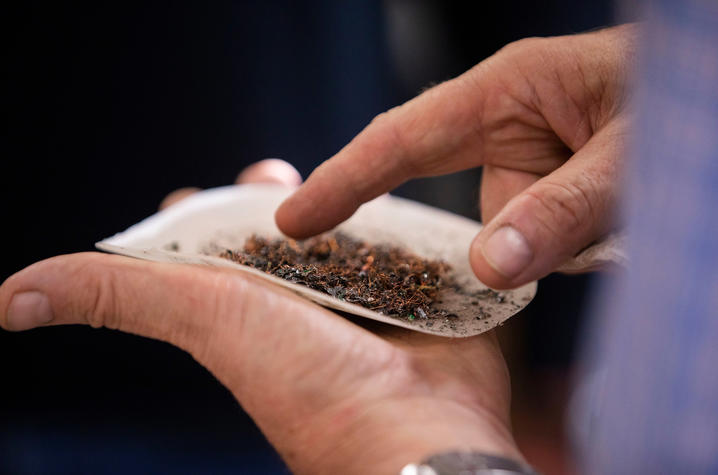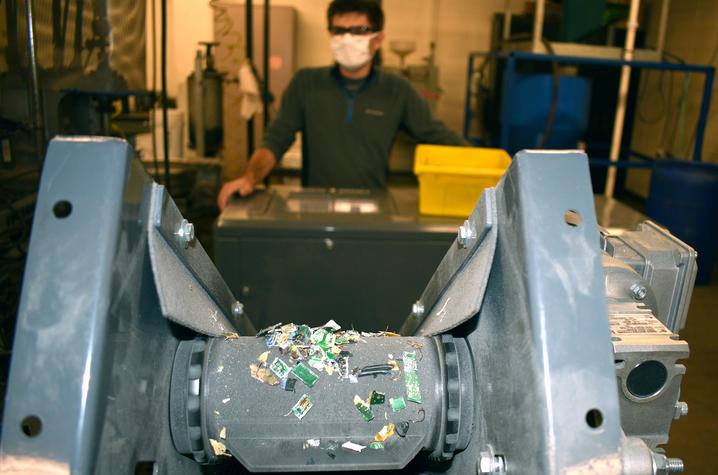UK CAER, Mining Engineering Collaborate to Launch New, Sustainable Electronics Recycling Program
LEXINGTON, Ky. (Oct. 26, 2020) — It doesn’t take long to encounter Jack Groppo’s passion. His email signature provides a direct indication: “This message was sent on an iPhone, which was made possible by mining 47 different minerals.”
Groppo, a University of Kentucky mining engineering professor and a researcher at the UK Center for Applied Energy Research (CAER), is spearheading an effort to turn domestic electronics waste into a Kentucky industry. He, along with fellow mining engineering faculty member Josh Werner, are building an electronics recycling program at UK that will educate, train and conduct research in a field that they believe holds great promise for the next generation of scientists, engineers and technicians.
“Vertically integrated recycling solutions are virtually nonexistent in America right now,” Groppo said. “Those that are trying to recycle their devices drop their mobile phones, laptops and computers at an electronics store or recycling center. They are then shipped to a disassembly site where batteries and metal-rich components are removed for further upgrading, almost all of which occurs offshore.
“Our program is trying to change that. We want to ‘mine’ the important metals out of those devices right here in Kentucky, and sell those valuable materials to create a sustainable, transformative electronics recycling program at the University of Kentucky.”
The program has had early support and success from both industry and the university. Lexmark is partnering with UK to explore recycling and recovery of precious metals from end-of-life electronic products.
Groppo and Werner received a 2020 UK Sustainability Challenge Grant to develop separation and processing systems at UK. The project is the first of its kind to recover valuable and critical materials sustainably and ethically, with UK students collecting personal items such as old phones, tablets, power supplies, cables, etc. from UK students, faculty and staff.
Recovery and sorting will be carried out as a service project by UK mining engineering students. Physical/chemical/metallurgical processing incorporating leaching, solvent extraction and electrowinning for metal recovery and purification will be carried out as laboratory design projects in Minerals Processing (MNG 301) and Sustainable Materials and Recycling Technologies (MNG 570) courses.
CAER is building an educational pilot plant, incorporating methods learned in UK laboratories, to process collected electronic scrap. The pilot plant will be designed, constructed, and operated by students and will be financially supported by the sale of marketable metals (gold, silver, copper, aluminum, etc.).
UK Recycling is very supportive of this groundbreaking effort to recover valuable material from the personal electronics waste of the campus community. Since 2015, UK Recycling has had a contract with a private firm to recycle university-owned electronics waste. Through this partnership, an average of 200,000 pounds of electronics waste has been responsibly handled and recycled annually. UK Recycling works closely with its contract partner to make sure this waste is handled in a secure, safe and sustainable manner; following all applicable regulations and requiring documentation for destruction and proper downstream disposal for all electronic waste. For more information about recycling university-owned devices, contact recycle@uky.edu.
The environmental aspects of this education, research and outreach project are clear, but it is the educational and research components that have Groppo energized.
“We are training students for future jobs that have not yet been created,” Groppo said. “UK students are going to be at the forefront of an industry that is going to grow significantly over the next several decades. As I often tell prospective students, that is why you come to the University of Kentucky. You get to learn about what is next, get hands-on training, and learn how to develop marketable, real-life skills.”
As the state’s flagship, land-grant institution, the University of Kentucky exists to advance the Commonwealth. We do that by preparing the next generation of leaders — placing students at the heart of everything we do — and transforming the lives of Kentuckians through education, research and creative work, service and health care. We pride ourselves on being a catalyst for breakthroughs and a force for healing, a place where ingenuity unfolds. It's all made possible by our people — visionaries, disruptors and pioneers — who make up 200 academic programs, a $476.5 million research and development enterprise and a world-class medical center, all on one campus.






